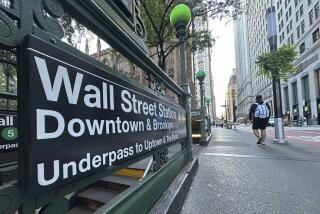Stocks edge up to new highs after China trade deal becomes official

Stocks on Wall Street closed out a listless day Friday with tiny gains that were enough to propel the Standard & Poor’s 500 index and the Nasdaq to new record highs.
The United States and China revealed they have reached an initial deal in their long-running trade war. The Phase 1 agreement means the U.S. won’t impose new tariffs on Chinese goods that had been set to kick in this weekend. Investors’ anxiety over the prospect of such an escalation in the trade war contributed to a sluggish start for the market this month.
On Thursday, media reports signaling that a deal was close spurred a rally that sent the S&P 500 and the Nasdaq to record highs. That likely led Friday’s muted reaction to official announcements of the deal.
“People obviously were excited about what they heard yesterday, and now what you’re seeing is a consolidation now that it’s actually been confirmed,” said Lisa Erickson, head of the traditional investment group at U.S. Bank Wealth Management.
Technology companies, which rely heavily on China for sales and parts, led the gainers Friday, outweighing losses in banks, energy firms and other stocks. Bond prices rose, pulling yields down.
The S&P 500 edged up just 0.23 of a point, or less than 0.1%, to close at an all-time high of 3,168.80.
The Dow Jones industrial average inched up 3.33 points, or less than 0.1%, to 28,135.38.
The Nasdaq, which is heavily weighted with technology stocks, rose 17.56 points, or 0.2%, to 8,734.88.
The Russell 2000 index of smaller-company stocks fell 6.84 points, or 0.4%, to 1,637.98.
The S&P 500 ended the week with its third straight weekly gain. With less than three weeks left in 2019, the benchmark index is up 26.4% for the year.
The stock indexes were little changed most of Friday as investors weighed the implications of the trade deal.
The costly trade conflict and the threat it could escalate at any moment has been the biggest source of uncertainty for Wall Street this year. The dispute has also hurt manufacturing around the world and caused U.S. businesses to hold back on making investments. The saving grace for the economy has been a strong job market and consumer spending.
It’s unclear how much uncertainty the partial trade deal removes. The trade war has had more than a few swings since it started 17 months ago.
“We got something, but until we have a full-fledged deal, it may be tough to get excited,” said JJ Kinahan, chief market strategist for TD Ameritrade.
The next phase of the trade agreement will have to tackle some of the larger issues to provide relief from existing tariffs.
“It’s going to be a bigger lift, in large part because the president doesn’t really want to take the tariffs off,” said Jamie Cox, managing partner for Harris Financial Group. “That’s going to require much more give on the Chinese part than what is currently in the offer.”
Technology stocks were the biggest winners Friday. Adobe climbed 3.9% after issuing quarterly results that beat Wall Street’s estimates.
Facebook fell 1.3% amid reports that the Federal Trade Commission could block the company from integrating its messaging apps, including Messenger and WhatsApp. Facebook has been planning to integrate those apps since early this year. Federal regulators are concerned that integration could make it hard to break up the company if the Federal Trade Commission finds a breakup necessary.
Utilities, household goods makers and real estate firms notched gains.
The yield on the 10-year Treasury dropped to 1.83% from 1.90%.
Bank stocks posted the biggest decline Friday, pushed down by that decline in bond yields, which are used to set the interest rates that lenders charge on mortgages and other consumer loans. Wells Fargo shares slid 1.1%.
The government said U.S. retail sales rose at a seasonally adjusted 0.2% rate in November. The modest pace fell short of analysts’ forecasts for a pickup of 0.5% and suggests the holiday shopping season got off to a slow start.
Several department store stocks fell. Macy’s dropped 3.4%. Nordstrom lost 3.3%. L Brands, the parent of Victoria’s Secret and Bath & Body Works, slid 4.2%.
British stocks and the British pound moved sharply higher, the day after a resounding victory for the Conservative Party eased uncertainty over the nation’s upcoming exit from the European Union.
Benchmark crude oil rose 89 cents to settle at $60.07 a barrel. Brent crude oil, the international standard, climbed $1.02 to close at $65.22 a barrel. Wholesale gasoline rose 3 cents to $1.66 a gallon. Heating oil climbed 4 cents to $1.99 a gallon. Natural gas fell 3 cents to $2.30 per 1,000 cubic feet.
Gold rose $8.90 to $1,475.60 an ounce. Silver rose 6 cents to $16.91 an ounce. Copper fell 1 cent to $2.78 a pound.
More to Read
Inside the business of entertainment
The Wide Shot brings you news, analysis and insights on everything from streaming wars to production — and what it all means for the future.
You may occasionally receive promotional content from the Los Angeles Times.








